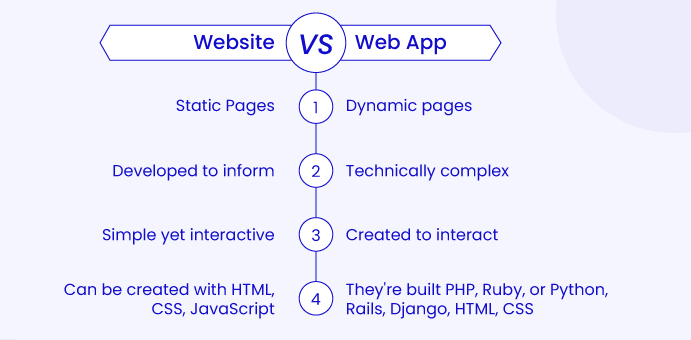SEO Checklist to Optimize Your Website for Success in 2024
Jactone on 03.05.2024
In this digital era, the need for a well-optimized website is key...

Personalize Theme


Are you having difficulty deciding between a web application and a website for your business? Well, you're not alone! Both platforms give you the ability to showcase your products and services, engage with your audience online, and build a devoted customer base. Making the best decision for your business might sometimes be difficult. In this article, a brief comparison is made to help you understand the differences between websites and web applications so you can make a well-informed choice for your business.
A website is an online collection of linked web pages that may be accessed via the internet. It's a digital platform that allows people, companies, groups, and other entities to interact with users, display products or services, as well as provide information. Usually, a web browser like Google Chrome, Mozilla Firefox, or Safari is used to access websites. Websites may include text, photos, videos, audio files, and interactive components, among other kinds of content. Websites are frequently used for e-commerce, informational sharing, product and service promotion, and communication facilitation.
If your needs are straightforward and don't require complicated procedures, a website will be more than adequate to serve your goal. This is especially useful if all you need to market your services is an internet presence. Under such circumstances, going with a simple content management system design would fulfill your requirements.
A Static website is a website that is created exclusively with HTML, CSS, and JavaScript. It is made up of pre-designed and pre-built web pages with static content that doesn't change over time. A static website does not use server-side processing or databases; instead, the content is hardcoded into the HTML files. Are you trying to find a trustworthy way to build your web presence? There's nowhere else to look! Hals Tech Solutions is here to offer you excellent static website services customized to meet your business requirements.
Dynamic websites on the other hand are characterized by functionality and responsiveness. These websites can manage and display dynamic information (information that keeps on changing) that is customized for each user since they are designed with programming languages like Django, JavaScript, PHP, or ASP. Big businesses that need to handle massive amounts of data at once are best suited for dynamic websites. Dynamic websites are often used by companies who want to engage their audience and offer tailored content because of their ability to adapt and create individual user experiences.
Commonly known as a "web app," a web application is a kind of software that runs on a web server and may be accessed through a web browser. It is developed to carry out particular functions or give consumers access to certain features via the internet. Web applications can be accessed remotely through a network connection, unlike typical desktop applications installed locally on a computer. Web technologies like HTML, CSS, and JavaScript are used in the development of web applications; these are frequently combined with server-side programming languages like PHP, Python, Ruby, or Java. They make use of the client-server architecture, in which the web browser serves as the client and sends requests to the web server, which responds by processing the requests and returning the required data or resources to the client (the browser).
A web application is the best option if you're building an eCommerce site or any other system with complex, interrelated procedures. This is to allow numerous operations to be handled effectively at the same time within a single system .

The key differences between a website and a web application are in how they
function and the problems they solve. A website gives users access to resources,
information, and static content about a person, company, or organization.
It usually provides information by presenting text, photos, and videos appealingly.
The majority of websites are made with passive consumption in mind, enabling users to
browse pages and obtain content with little to no interaction. Examples of websites include
Blog sites, news portals, and business websites.
A web application, on the other hand, offers more than just static content delivery.
It is an interactive and dynamic software that is hosted on a web server and can be
used over a web browser. Web applications are made to carry out particular functions
and give users access to functionalities. They entail user interactions, manipulations of data,
and sophisticated operations. Web applications, as opposed to websites, frequently need user input,
process data, and produce dynamic content automatically. Examples of web apps include;
Social networking platforms, e-commerce sites, online banking systems, and project management software.
I hope you enjoyed reading the blog post!